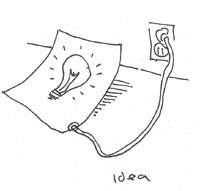Recently an acquaintance of mine who lives in Israel has been posting some rather unsavory things on facebook. I don’t take sides on the issue. It just seems such a mess of violence
that I can’t see either as being “right” or “wrong”, but I don’t like
the violent rhetoric coming from either side of the divide. There’s been
more than once the my mouse has hovered over the remove from my
timeline section before relenting.
It did make me realise how easy it has become today to remove things that we are uncomfortable with from our world and how it’s even easier to surround ourselves with ideas that we agree with. If you don’t like what someone is saying then just unfriend them. You think the television is too liberal then turn on Fox news, not Liberal enough then Jon Stewart is there. Even here on blog sites we can follow people who we on some level agree with and not follow those we don’t. It’s a dangerous situation, because it means there is no more dialogue. People can sit behind their respective walls and only allow in information that agrees with their current paradigm. They can paint the other side as a demonic or idiot enemy, that just doesn’t understand the true way. In the end, it will only lead to violence and division in society.
I’m a big fan of the “I love @#$%ing science”, posts that appear on facebook. But now and again there is a post that gives insight into the fundamentalist nature of some of the posters. It seems some would like to instate some type of Scientoracy on the world – and idea that admit I feel draw towards in some ways, but know to be absurd. But once you surround yourself with only people like yourself, these ideas start to seem normal. Likewise I’m sure there is a creationist site where they sit around tutting at people who believe only in science and want to bring in a theocracy and can’t understand for a second why anyone would think otherwise. After all everyone else that they know thinks it’s a fantastic idea. It’s the same for Labour and conservatives, democrats and republicans, Israel and Palestine. Both sides can only see insane charactures of the others. I’ve met some creationist, while I find there view on that one subject to be… well... rather strange. In other ways they seemed to normal intelligent people. And that’s the danger: if we don’t have dialogue, then we start to dehumanise people and that’s lead to all kinds of trouble in the past.
While I might be wrong, it seems that there is risk of the problem being ten fold for younger generations who have never lived without the ability to wall of others beliefs.
While I don’t agree with what she’s saying, I’m going to keep my pro-Israel acquaintance on facebook and try to understand her point of view. Likewise I hope I can expand my interaction with other people outside of my normal way of thinking. It seems one of the best ways to grow.
It did make me realise how easy it has become today to remove things that we are uncomfortable with from our world and how it’s even easier to surround ourselves with ideas that we agree with. If you don’t like what someone is saying then just unfriend them. You think the television is too liberal then turn on Fox news, not Liberal enough then Jon Stewart is there. Even here on blog sites we can follow people who we on some level agree with and not follow those we don’t. It’s a dangerous situation, because it means there is no more dialogue. People can sit behind their respective walls and only allow in information that agrees with their current paradigm. They can paint the other side as a demonic or idiot enemy, that just doesn’t understand the true way. In the end, it will only lead to violence and division in society.
I’m a big fan of the “I love @#$%ing science”, posts that appear on facebook. But now and again there is a post that gives insight into the fundamentalist nature of some of the posters. It seems some would like to instate some type of Scientoracy on the world – and idea that admit I feel draw towards in some ways, but know to be absurd. But once you surround yourself with only people like yourself, these ideas start to seem normal. Likewise I’m sure there is a creationist site where they sit around tutting at people who believe only in science and want to bring in a theocracy and can’t understand for a second why anyone would think otherwise. After all everyone else that they know thinks it’s a fantastic idea. It’s the same for Labour and conservatives, democrats and republicans, Israel and Palestine. Both sides can only see insane charactures of the others. I’ve met some creationist, while I find there view on that one subject to be… well... rather strange. In other ways they seemed to normal intelligent people. And that’s the danger: if we don’t have dialogue, then we start to dehumanise people and that’s lead to all kinds of trouble in the past.
While I might be wrong, it seems that there is risk of the problem being ten fold for younger generations who have never lived without the ability to wall of others beliefs.
While I don’t agree with what she’s saying, I’m going to keep my pro-Israel acquaintance on facebook and try to understand her point of view. Likewise I hope I can expand my interaction with other people outside of my normal way of thinking. It seems one of the best ways to grow.










